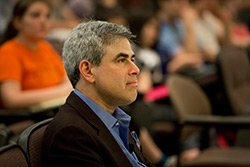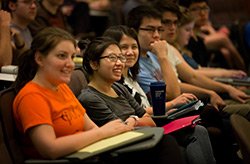Watch: Jonathan Haidt Talk Concludes Four-Part Righteous Mind Symposium
A campus visit by Jonathan Haidt, author of The Righteous Mind: Why Good People are Divided by Politics and Religion, concluded a series of symposia organized by Barry Schwartz, Dorwin P. Cartwright Professor of Social Theory and Social Action, and Professor Emeritus of Philosophy Richard Schuldenfrei, with support from the Swarthmore College Institute for the Liberal Arts. The events kicked off in October and addressed specific concepts offered by Haidt, who considers findings in social psychology, evolutionary biology, sociology, and philosophy to explain why political ideology has become increasingly polarized in the U.S. His book, its claims, and the year-long series of events were designed to inspire productive dialogue on the topic of mutual understanding.

Haidt's talk, "Why America is So Polarized and What We Can Do About It," was the culminating event. Previous conversations, led by faculty, included "The Limits of Reason in Moral Thinking," "Moral Differences Between Liberals and Conservatives," "Morality and Evolution," and "Religion and Social Cohesion." Each symposium prompted wide-ranging discussions in support of, and in opposition to, Haidt's claims.
In The Righteous Mind, which was reviewed in the New York Times by William Saletan '87, Haidt argues that people are more intuitive than rational; therefore, their personal perspectives are motivated by their own conclusions.
During his presentation, Haidt said that his book was borne in his quest to explain the increasingly polarized political climate in America, despite the reality that things are going relatively well in the U.S. - rape and homicide rates are down, wealth is increasing, and the threats associated with the Cold War have faded. "So why doesn't it feel good? A lot of it has to do with our political paralysis," he said. "Mathematically, it can't get much worse."
According to Haidt, today's political climate nurtures an attitude toward "demonization." It is no longer just a difference of opinion; it is a difference of core values, which translates into a fight between good and evil. "The fault is not in our policies and institutions, but in ourselves," he said. "We are too quick to be righteous and too quick to demonize."

Haidt said one of many factors that began a shift toward polarization was the change from the Greatest Generation, who united to fight a common enemy during World War II, to the Baby Boomers. Other dynamics that helped nurture polarization: a change from a centrist media platform to an array of party-aligned news channels; residential homogenization; and, perhaps most importantly, a change in Washington, D.C. In 1994, Haidt noted, Speaker of the House Newt Gingrich changed the legislative calendar, which ultimately limited the amount of time lawmakers - and their families - spent together in Washington. Limiting the time members of opposing parties spend together socially, has polarizing effects, since human relationships tend to overpower the pull toward demonization, according to Haidt.
"We can't reverse most of the changes that brought us hyper-polarization," Haidt said. "So what can we do? Most of what's needed are institutional reforms, but it's not all institutions. Moral psychology can help. You can't persuade people with reasons and evidence alone. Each of us is flawed and biased in our reasoning and blind to our biases. We need ways to meet on friendly ground. Relationships open hearts, and open hearts open minds ... The most important thing is not demonizing. It poisons compromise and understanding."


